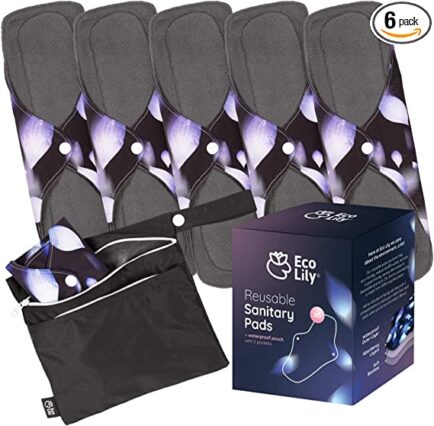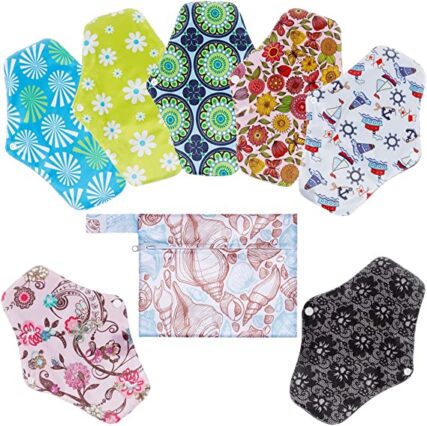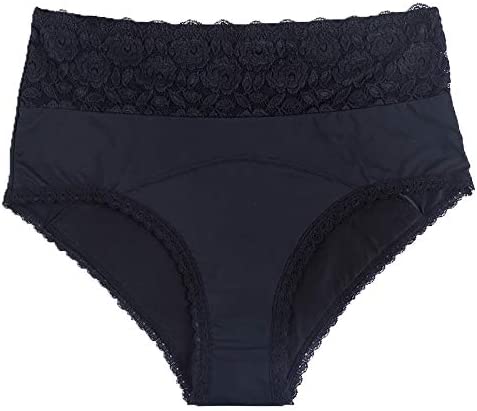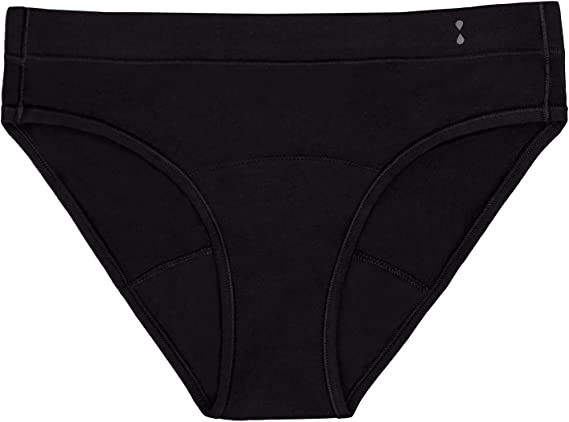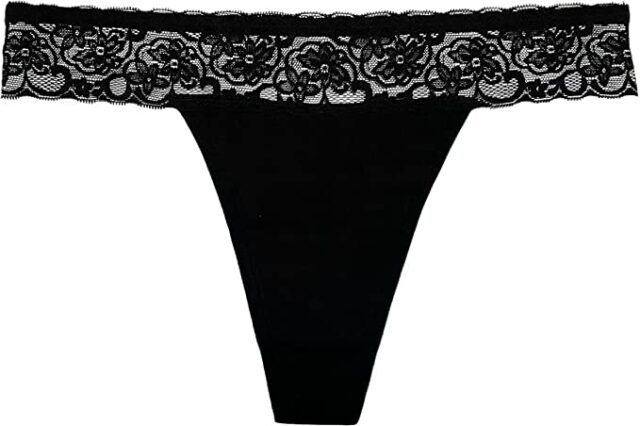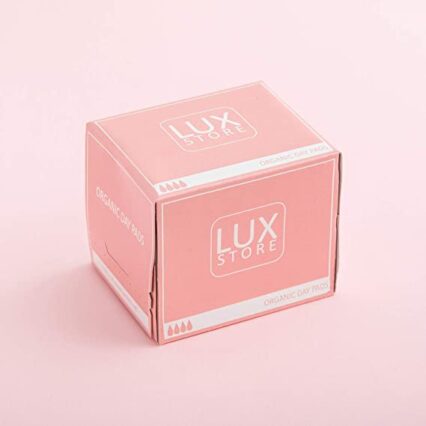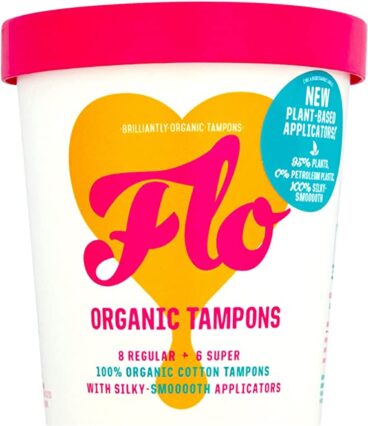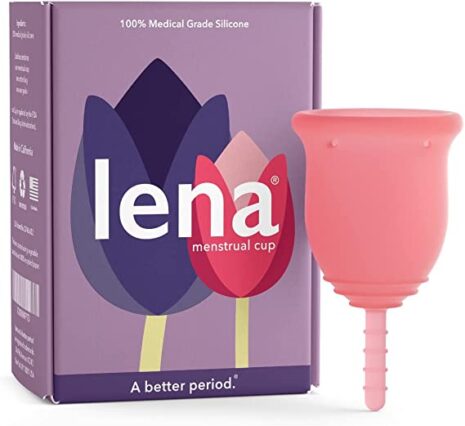What are the best eco-friendly tampons? Are there biodegradable pads? What eco-friendly period products are there? Many of us have questions when looking for period products that don’t impact the environment. Thankfully, there are now more choices than ever. This can help make a positive difference to the ecosystem, our health and save money along the way.
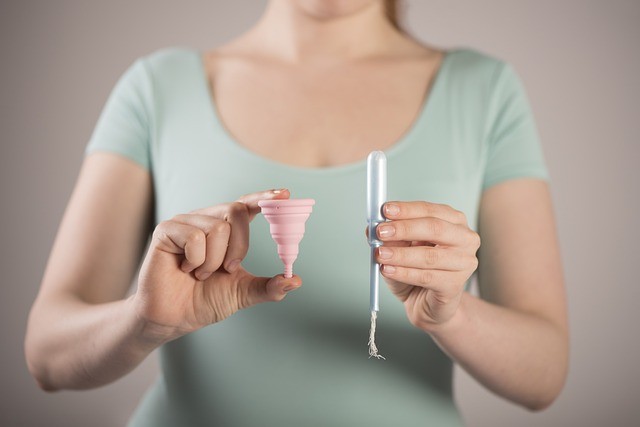
When it comes to periods, the first thing that springs to mind is cramping, discomfort, nausea and mood swings. Rarely does the thought of the impact on the environment enter the mind.
There are so many sustainable period products now available that will help reduce your impact on the environment. Even better, they are comfortable to use too. This guide will look at why conventional pads and tampons are bad for you and the planet, and what products are available to help you find the solution that works for you and your lifestyle.
Why should you switch to eco-friendly period products?
Chemicals in Sanitary Products
Many studies, such as the Chem Fatale Report, have found numerous harmful chemicals like Phthalates, Bisphenols and Parabens to be present in sanitary products. These are used to make the product softer and more flexible, or to prolong shelf life. These plasticiser chemicals fall under the umbrella of chemicals known as endocrine disruptors (EDC).
Endocrine disruptors are known to disrupt the endocrine system which is instrumental in regulating growth, development, reproduction and mood throughout the body. One study showed the amount of plastic in one standard pack of sanitary pads is equivalent to 5 carrier bags worth of plastic. Tampons aren’t much better either, with 6% of its material being plastic.
When broken down, that is a lot of harmful plasticisers in, or close to, our bodies for long periods of time. This is unnecessary, considering there are now plastic free period products available. To add to that, many of these products are bleached with chlorine, a process that produces one of the most toxic group of chemicals known to humans, Dioxins.
Exposure to these chemicals, especially EDC’s is concerning, especially at key developmental times like puberty, pregnancy and the menopause and with sanitary products starting during puberty, the use of these disruptors are that much more worrying.
Irritating Fragrances
Fragrances added to menstrual products to help them smell nice, could actually have the opposite effect. These chemical fragrances can interfere with the natural pH balance of the vagina, as well as disrupt the natural good bacteria that help the vagina stay clean. This could lead to irritation and possibly infection, and may in turn produce more odour itself. There’s also the extra discomfort that goes along with that.
Environmental and Financial Costs
Buying regular period products affects both the environment and your bank balance. A typical woman will menstruate 450 times, on average, in a lifetime and will consume between 5-15 thousand, either pads or tampons, in the process. Sadly, these discarded products end up in landfill as plastic waste, as most sanitary products aren’t recyclable for sanitary reasons.
These products will eventually be broken down into microplastics which will find their way into rivers, seas and oceans. Now, imagine the lower figure of 5000 products per person and multiply by the hundreds of millions of users, and you can see how this can become a major environmental issue.
Finally, there’s personal financial cost to yourself. At the time of writing, the average price per unit of either tampons or pads is £0.16. Multiply that by the amount used in a lifetime, and that could mean up to £2400 overall. Compared to an average menstrual cup costing £15 and lasting you 5 years, you could be saving the environment and saving yourself money too. It’s a win-win situation.
What are the best Eco-Friendly Period Products?
There is a huge variety of eco-friendly period products available. You can either use comparable products like disposable pads or tampons that are ecologically and medically better, or opt for reusable types of pads. Another option is to move across to a different solution, in the form of period pants or menstrual cups. Let’s look at the options.
Reusable Sanitary Pads
Reusable sanitary pads have developed and transformed over the years. They are just as light and thin as your regular pads and great on even your heaviest flow days. Instead of the plastic peeling on the back of the pads, these have a clip at the wings to help safely secure them.
Reusable period pads look similar to your regular pads, but these will last for years and save both money and filling up landfill sites with unnecessary plastic waste. All you have to do is rinse them under water and then pop in your washing machine in a separate load, then hang to dry.
The only thing to look out for when purchasing is to find the right size for your lower size, rather than going on the flow. (If you look at this Eco Lily link, you will see a range flow rates, while the RovTop sanitary towels has a range of sizes too).
Period Underwear
Period pants, or period underwear, is designed to look like your regular underwear. They have moved on in style and not like something from a Bridget Jones movie. Products range from standard briefs to hip-huggers, boy-shorts and even companies selling period thongs.
These products have been designed with eco-friendly materials and have four breathable layers that easily absorbs, but reassuringly doesn’t allow blood to seep through to your clothes. They don’t feel bulky to wear either, and most pants can hold 2-3 tampons worth of blood. They are easily washable and can last for years if looked after properly.
Biodegradable Sanitary Pads
If the options so far don’t quite appeal, then another option is biodegradable period pads. These are made from organic cotton, and free from those harmful chemicals and plastics you have been using.
The main benefits of plastic free period pads are that you wouldn’t really notice anything different over your standard pads, but you reduce the health and ecological risks factors and environmental damage. The only downside is you are still purchasing regular products which can have an impact on your wallet. It also still feeds into the environmental impact of manufacturing and distribution, over products that can be reusable.
Plastic Free Eco-friendly Tampons
If tampons are still something you prefer, then like the biodegradable pads, there are also biodegradable tampons. These are made from organic cotton that is free from plastic, chlorine and bleaches, and are fragrance free too. They even come with plant-based applicators for a total guilt free experience, and that can help you stay healthy and save the planet at the same time.
Menstrual Cups
Menstrual cups are a no-brainer when it comes to a totally sustainable sanitary products. Cups can be reused for 5-10 years (depending on manufacturer) before needing replacing. They are durable, soft and flexible, and don’t have that uncomfortable wet feeling you get with pads or leaking tampons. When you need to change them, all you have to do is empty the cup, rinse it off and reinsert.
One bonus of cups, unlike tampons, is they can last up to 12 hours before needing changing. Plus you don’t have the awkward issue of disposal like you do with other products in an unknown home or on a trip. They are slightly more awkward to remove and insert, but with practice it becomes second nature.
Menstrual cups are made from medical grade silicon, and are latex, BPA, dioxin and phlalate free. Why not try the most natural, eco-friendly period products on the market and make a big difference in the process?
Maybe now’s the time to try eco-friendly period products
When looking for the best eco friendly period products, there’s lots to choose from. That makes it easier than ever to ditch the chemically laden, plastic products in favour of something safer for your body, and better for the environment.

